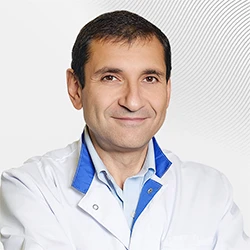Tells Olga Yatsishina,
endocrinologist, PhD
 There is a catch phrase: "There should be a lot of good people." But is it true?
There is a catch phrase: "There should be a lot of good people." But is it true?
What is the danger of overweight?
Even the ancient physician Hippocrates noted that "extremely obese people are much more likely to die than thin ones." Recent studies have shown that overweight and obesity are closely linked to serious diseases such as coronary heart disease, hypertension, and type 2 diabetes mellitus. If a person is overweight, the risk of developing osteoarthritis, gallstone disease, colon cancer, and varicose veins increases. In women, obesity is accompanied by menstrual irregularities, anovulation (lack of ovulation), infertility, hyperplasia, and endometrial and uterine polyposis. In men, being overweight can be a cause of impaired sexual function, infertility, and delayed puberty in boys.
Today, no one doubts the fact that obesity is a chronic recurrent disease, and one of the most common – currently, every fourth inhabitant of our planet is overweight.
What are the causes of overweight?
Overweight develops when the amount of energy coming from food exceeds the energy expenditure of the body – a positive energy balance is created, and excess energy reserves are deposited in the form of fats.
However, there are situations when you follow a healthy lifestyle, your diet is balanced, you move a lot, but you continue to gain weight steadily. In this case, before you engage in weight loss, you need to visit an endocrinologist, who will prescribe the necessary examination to rule out hormonal disorders that may be the cause of obesity. If there are problems with the endocrine system, the specialist will adjust the course of treatment aimed at weight loss.
Treatment of obesity
Treatment is aimed at limiting the energy entering the body with food and increasing its consumption. The therapy is based on a balanced diet. The endocrinologist analyzes the patient's diet, identifies dietary and lifestyle disorders that have led to overweight, and plans a phased treatment program.
Regular physical activity is an important step in the treatment of overweight. Walking at a fast pace, running, swimming, cycling, and skiing are the most effective ways to increase energy consumption. It is recommended to gradually increase the duration and intensity of exercise, depending on your initial level of physical activity and overall health.
Today, various methods of weight loss are widely promoted in the media that do not require any effort on the part of a person who wants to lose weight ("lose weight in a dream", taking various "smart" pills and dietary supplements for weight loss). Unfortunately, there are no miracles. And it's hardly worth harboring illusions, expecting weight loss, without changing your lifestyle and nutrition.
Set realistic goals
Many people, especially the beautiful half of humanity, want to get a tangible effect in record time. However, recent studies in endocrinology show that slow, gradual weight loss – by 5-10% of the initial body weight over 5-6 months or 0.5-1 kg per week - brings real benefits, not harm to health. In this case, the decrease in body weight occurs precisely due to adipose tissue. If you starve yourself, you will certainly lose weight in a short time. But as soon as you return to your usual diet, you will most likely gain not only the hard–lost pounds, but also gain more weight - this is how the body takes care of you, trying to protect itself from exhaustion, remembering the previous stress of starvation. In addition, rapid weight loss adversely affects the condition of the skin.
In conclusion, I would like to note that the main principle of obesity treatment, which is practiced by specialists of the European Medical Center, is a comprehensive individual approach to the patient, requiring the participation of href="/articles/kak-podgotovitsya-k-konsultacii-bariatricheskogo-hirurga/">специалиста-эндокринолога , the definition of real achievable goals, long-term monitoring of the patient with the identification and correction of risk factors and concomitant diseases.








.webp)



.webp)


.webp)


.webp)


.webp)
.webp)

.webp)

